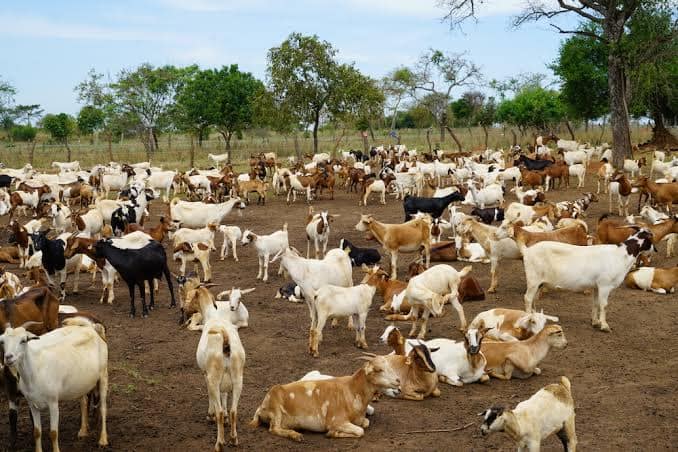Goat farming can be as profitable as cattle keeping or a piggery project if farmers took time to understand the business.
In order to be a successful goat farmer, there are basics you must consider or know before you start a goat farm. These include but not limited to the following:
Location: The most important consideration you must first make is location. Common goats generally survive in warm areas that are well drained. Apart from temperature, space is necessary. Goats live in groups, so individual pens are not effective. A large field is needed if you want your animals to roam freely. Freely roaming goats usually have better resistance to sickness and infection. The best locations for a goat farm are those that are far from towns because urban pollution is dangerous to animal health. Goats are known to eat a lot of grass on a daily basis. So make sure their food source is highly accessible and not too far from the rearing area.
ALSO READ: Bwogi Quit Three University Jobs To Rear Goats
Land requirement: Goats can be reared intensively on small acreage by using supplemental feed. If using an extensive system, 2 to 10 goats per acre is a rough guide depending on the supply of grass and brush.
Goats are top down grazers and will select from weeds, leaves and grasses to meet their own requirements. They can also help to improve marginal areas encouraging re-establishment of grassy species so providing low-cost environmental management.
The type of goat breed: The type of goat breed is the next important thing to consider when you start keeping goats. Depending on your purpose, there are breeds that produce more milk while there are also those that grow quickly. You can farm both types of breeds and you will be harvesting both meat and milk. Different breeds also require different levels of care. Make your research and consult an expert so he can help you decide what will be best for your farm.
Access to a veterinarian is another important thing to consider. When starting a goat farm, you expect many of your animals to contract diseases. A veterinarian can help you in disease control and management to avoid losses. Vets can also help you diagnose diseases or recommend vitamins and supplements to keep your animals in good health especially during stressful situations such as weaning.
Health: You must keep your goats healthy and strong. Build a big barn because goats live in groups. They must also be allowed to roam, run around and have fun. If the goats are bred well, they become rarely sick and they usually produce better milk and meat. Keeping them healthy by making them happy is not a hard task. Goats are very picky with food. They don’t eat dried or soiled grass. Make sure you have enough clean, fresh grass for them so they don’t go hungry.
Housing: With a well-designed barn or shed and good management, you are sure to reap all the profit you want from goat farming.
Local Types: There are three main local goat breeds in Uganda. The East African goats are the commonest and are found all over the country. They are not very large but mature very quickly.
At six months, they are more than ready for mating. These goats come in a variety of colours. The mature live weight is between 20-30kg.
The Mubende goat breed is commonly found in the central region, the north and north-west of Lake Victoria. It is predominant in the former greater Mubende district.
It is the largest local goat breed with a live weight of 30-35kgs in males and 25-30kgs in females. The breed has glossy fur with short straight hairs. The skins sell highly on the world market.
The Kigezi goat is found in south-western Uganda. It has a relatively thick, hairy skin with sparse long hair around the hind part of the animal. It is smaller than the Mubende goat, weighing 25-30kgs at maturity. They are characterised by a black and grey coat.
The best source of breeding stock is from good farmers, not the livestock markets. The true history of the parents can be learnt from your fellow farmers.
-Office of Agric Minister






am so interested in that project some source of finance please
Informative
It’s a good idea thanks
Interested in goat and diary farming.I have also keen interest in Matoke and coffee farming
So educative, how do I process fodder
Learned all basics and very good